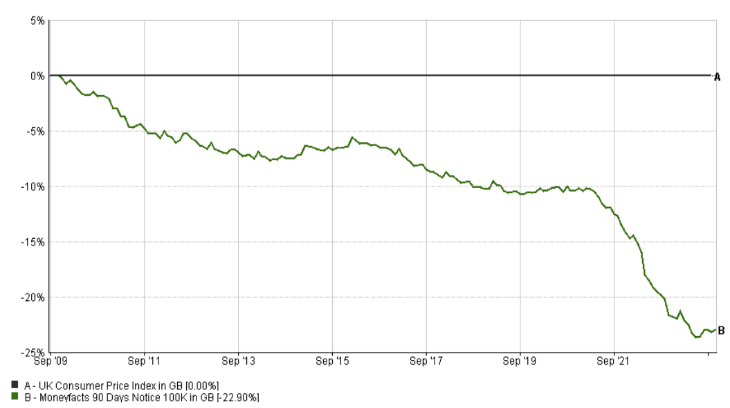MARKET UPDATE
Economic news continues to be dominated by inflation and interest rates, and there is now a hope that the former has fallen from its peak and that interest rates may have also reached, or at least are close to, their highest levels in the current cycle.
Despite this, a number of markets have failed to move forwards in the six months since our last newsletter was sent. Prices have been unusually range bound for both shares and bonds. This can be seen in the chart below which shows the average UK corporate bond fund (in purple) relative to a fund tracking the UK All Companies Index (in green), and it can be seen that both asset types are contained within a range of +1% and -5% for almost the entirety of the period.
![]()
Indeed, investors have now had to be patient for several years, because whilst volatility has been present, a portfolio equally weighted between the above two areas would have seen no overall gains for the last four years, even with the income being reinvested.
Against this background it is unsurprising that some investors are becoming disenfranchised and looking to cash as an alternative to other forms of investment. However, cash has historically performed badly over longer periods of time once inflation has been taken into account.
This is illustrated in the following chart, and this shows cash returns after they have been adjusted for inflation (using the Consumer Prices Index). The cash index used is based on the most competitive 90 Day Notice Account for a £100,000 deposit, with the account used being constantly changed to access the best returns possible.

The chart runs from the launch of the cash index in 2009.
By comparison other forms of investments, and particularly equities, have rewarded investors over the longer term, delivering returns significantly ahead of inflation and cash.
Returning to the earlier point that UK markets have barely risen for four years, rising interest rates does mean that financial markets need to reprice. Companies raising finance must offer rates ahead of those that can be achieved on deposit, and equities also need to reprice so that their future returns are ahead of such loans. Clearly companies cannot suddenly increase their profitability, but the stagnation in share prices whilst profits have increased does mean that this repricing is now arguably more fully reflected in markets.
This can be seen by comparing the “price to earnings ratio”. Four years ago, the FTSE 100 index was trading at a forward ‘price to earnings’ ratio of 14.6. In layman’s terms, you would have had to pay £14.60 for every £1 of earnings.
By contrast, the forward price to earnings ratio today stands at just 10.3, i.e. it now costs just £10.30 to secure the same £1 of income. Put another way, arguably the index is now almost 30% cheaper than four years ago.
Reasons to be Cheerful
With disappointing returns on investments for a number of years, and increasingly depressing news on a geopolitical level, it is easy to become despondent about the outlook. However, we have seen similar periods of stagnation in the past (and indeed war and political fallings out), but society and markets do adapt and change.
Innovation continues apace, including through new drugs providing better medical outcomes or the opportunities provided by Artificial Intelligence. As a fund manager recently commented, optimists tend to gather better returns than pessimists, and when looked at over history equity markets have had many more good years than bad.
We remain optimistic that over the medium term these positives will be reflected in market prices and asset values will continue to provide good opportunities over the medium to long term.
FEELING THE TAX PINCH
Inflation is of course not only eroding capital values and increasing people’s living costs, but in many cases, it is also reducing their real income. The higher rate tax threshold has been frozen at £50,270 since April 2021, but since that time prices (as measured by the Consumer Prices Index) have risen by 21%.
This means that someone previously earning broadly £50,000 now needs to earn £60,500 for their gross income to have kept pace with living costs. However, 42% of this increase will have been lost to income tax and National Insurance, meaning that their net income has only risen by broadly £6,000.
To exacerbate matters, rates are set to be frozen until April 2028. If inflation averaged 4% per annum over this period (significantly below the actual current rate), this would be equivalent to the higher rate tax band having been set at just £35,000 in 2021.
Those reliant on investment income are of course just as exposed to the effective reduction of the higher rate tax band. Investors have also been impacted by the reduction in capital gains tax allowances, with the allowance falling from £12,300 in 2022/23 to £6,000 this year and just £3,000 next year.
Proper planning can help to reduce the impact of ‘creeping’ tax bands, and this is becoming ever more important to protect real living standards. Examples can include using the Individual Savings Account allowances, pension allowances or simply by rebalancing income between spouses where possible to make use of all available allowances.
We continue to focus on tax planning as well as investment positioning when carrying out annual portfolio reviews, but if you have any questions or concerns regarding this then please do let us know.

It is of course true that the tax brackets could change if a different government is elected in due course. A General Election (which must take place by January 2025 but is more likely to take place in 2024) is unlikely to result in a reduction in tax payments, particularly for wealthier members of society. If anything, a new administration may well be minded to raise the tax take to meet their own policy agenda. The increasing interest rates are impacting the nation’s borrowing costs too, further reducing the prospect of tax cuts.
A US presidential election is of course also due to take place next year (November), and this could have a significant impact on markets, currencies and the global economy. We will watch developments as we approach both elections and keep this in mind in the advice we provide.
FINAL NOTE
The purpose of this newsletter is to provide a commentary for general interest purposes. It is not intended to provide recommendations, or to provide a deep technical analysis. If you would like more detailed information, or have any questions regarding your individual portfolio, then please speak to your usual adviser. Thank you.

